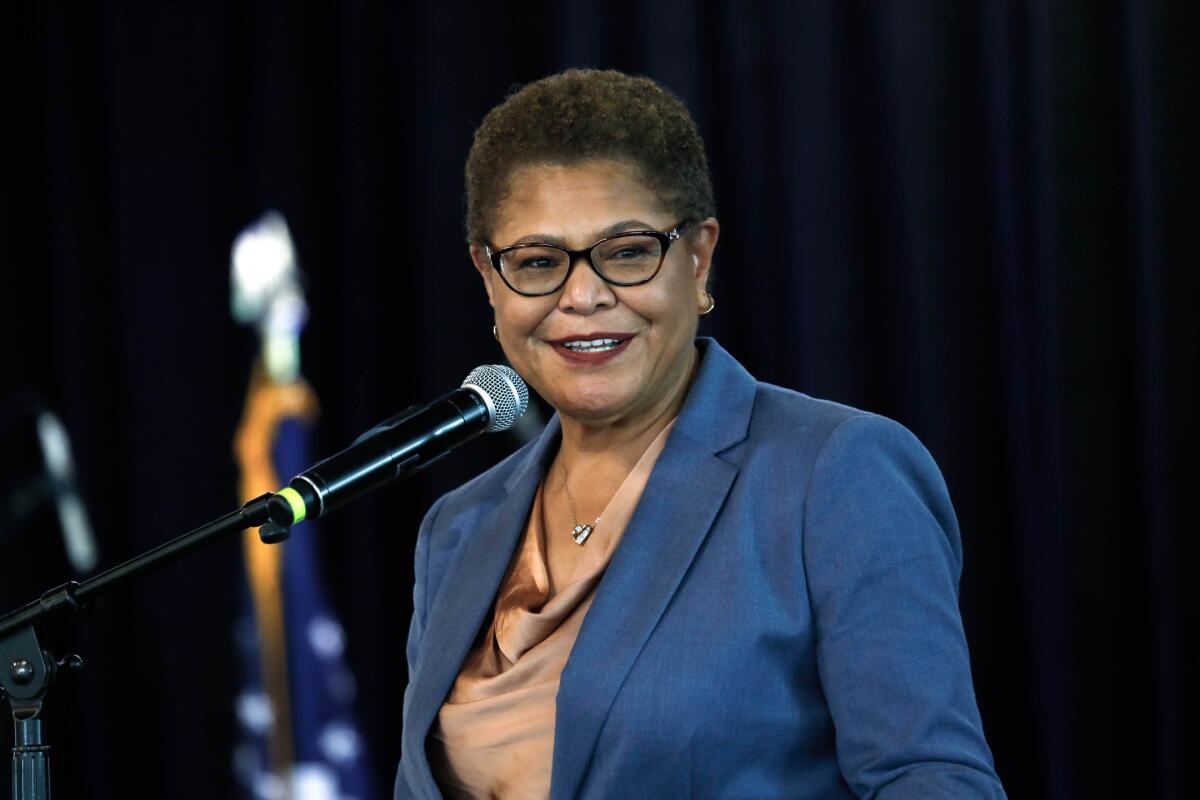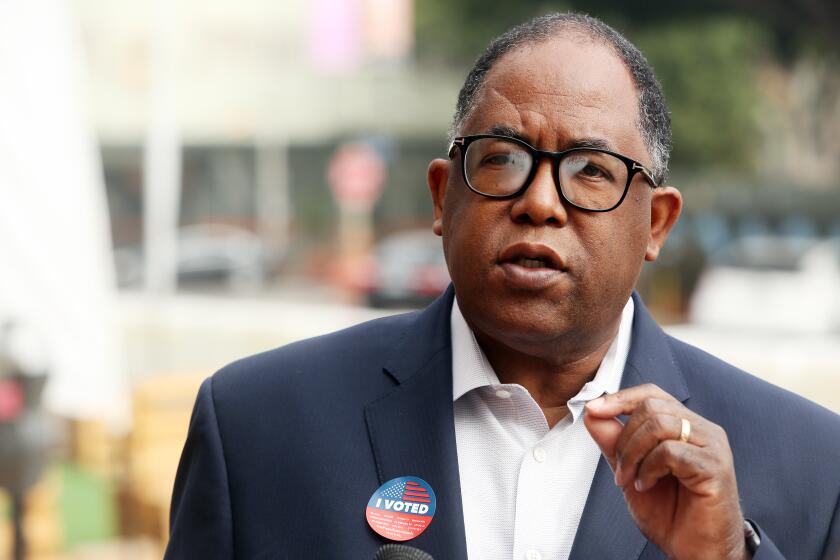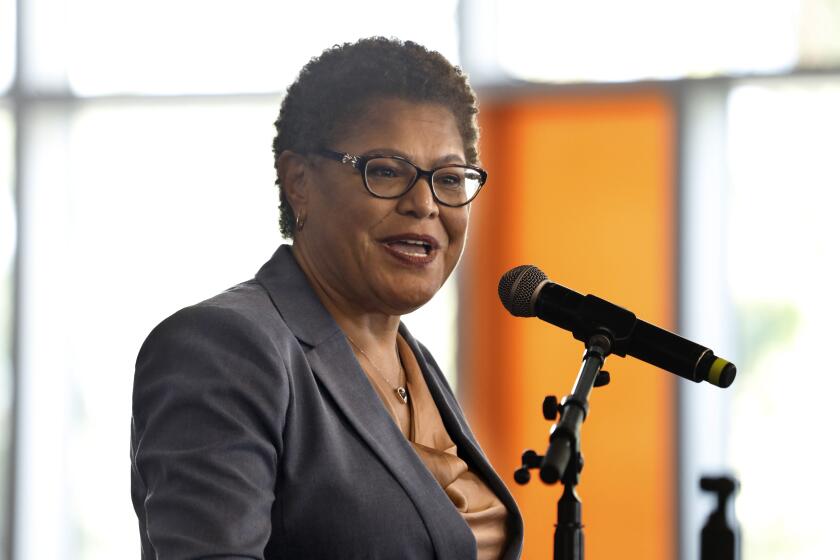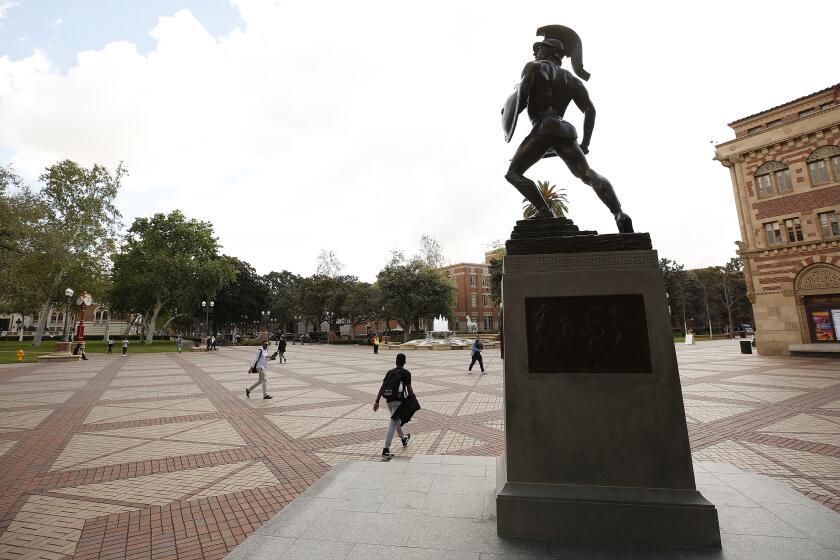USC gave Rep. Karen Bass a full scholarship worth $95,000 while she served in Congress

During Rep. Karen Bass’ first year in Congress in 2011, she contacted government ethics officials with a request: Could she accept a full scholarship for a graduate degree at USC.
The House Committee on Ethics cleared Bass’ request to accept the USC School of Social Work tuition award, ultimately valued at over $95,000.
Bass, the Los Angeles Democrat, has frequently spoken of how she juggled the demands of an online master’s program during her first three terms in Congress. She graduated in 2015 and credits the USC program with deepening her understanding of child welfare policy and helping her become a national advocate for foster youth.
How she got the scholarship offers a window into the lengths USC has gone to forge bonds with local politicians, a practice that is now facing new scrutiny.
The private university was by far the biggest employer in Bass’ congressional district, which stretches from the edge of downtown L.A. to the Westside.
Some of her coursework was supervised by a prominent campaign donor who was also a USC professor at the time. And the then-dean of USC’s social work school, Marilyn Flynn, offered the scholarship to Bass even though she had not directly applied to the social work program, according to interviews and records reviewed by The Times.
Full coverage of Mark Ridley-Thomas, his son and the USC School of Social Work.
Federal prosecutors indicted Flynn last month, alleging that she provided a full scholarship and teaching job in 2017 and 2018 to the son of then-L.A. County Supervisor Mark Ridley-Thomas in exchange for government contracts awarded to the university.
Bass has not been accused of wrongdoing regarding the scholarship. She is now a leading candidate in the race for L.A. mayor.
Although Bass met with USC’s leaders, including visits by trustees and administrators to Capitol Hill and events at its South L.A. campus, she emphasized in a recent interview that she had not put forth legislation that benefited the university.
Bass said the House Committee on Ethics approved the scholarship because the committee understood it would help her do her job. Getting the graduate degree would “assist me in being a member of Congress focused on an area of policy that impacted the young people in my district and around the country,” Bass said.
USC’s press office told The Times that the social work program was under “new leadership” and could not address “what policies and procedures were in place at the School of Social Work 10 years ago.”
Flynn’s defense attorney, Vicki Podberesky, declined to comment on the scholarship to Bass or how it came about. Both Flynn and Ridley-Thomas, the now-suspended L.A. City Council member, have pleaded not guilty to the federal charges.
With Rep. Karen Bass giving up her seat, some worry about L.A.’s Black representation.
The full value of Bass’ scholarship was not listed on her congressional disclosure forms until 2019, when forms from several years were amended and a total of more than $80,000 in free tuition was added to her gift disclosures. Bass attributed the errors to her former chief of staff, noting they were discovered in an audit by her lawyer.
A 2011 letter from the House Committee on Ethics to Bass offers insight into what led USC to provide the full scholarship. As they considered the request for the gift waiver, officials collected information from Flynn and Bass.
Flynn said she personally decided to give the scholarship to Bass, according to the letter.
The dean acknowledged at the time that the full-tuition package like that given to Bass was not publicized to students. Scholarships advertised to students online required an application process, had formal requirements and were typically less generous. Flynn said the free tuition to Bass was given to those “who have demonstrated an exceptional potential for contribution to the field,” according to the committee’s letter.
Bass was a “worthy recipient” of a scholarship, Flynn told officials, because of her foster care work and her “obvious leadership skills.”
Former USC dean Marilyn Louise Flynn denies federal charges she bribed former L.A. County Supervisor Mark Ridley-Thomas for county contracts with USC.
House ethics officials ultimately concluded that although the scholarship was “clearly” a gift — which lawmakers are broadly prohibited from accepting — this constituted “an unusual case” warranting an exception, or a waiver.
Bass said in the interview that she had first applied for a public administration master’s degree at the university, but abandoned that idea when she realized that she had to pay the tuition herself. As a former clinical instructor and physician assistant whose involvement with USC dates to the early 1980s, Bass said, she mistakenly thought she would have free access to classes.
Flynn learned of Bass’ interest in graduate school and approached her about a joint social work and public administration master’s degree. The online coursework — which she often completed on nights, weekends and during flights to and from Washington, D.C., the congresswoman has said — offered Bass a chance to dive deep into a topic she had long cared about, first as a community organizer and later as a state assemblywoman.
“One of the things that everybody in the world knew and knows about me is my focus on foster care,” Bass said, explaining why Flynn likely approached her. “And that I wanted to make it a prominent issue. I did in Sacramento, I planned to do it in D.C.”
“I considered it extremely useful — a good use of my time,” she said of her education.
Her coursework topics included social service policy, social welfare, and child abuse intervention and treatment, and she graduated with a 3.95 grade point average, according to a copy of her academic transcript provided by her campaign.
R. Paul Maiden, the now-retired vice dean of the USC School of Social Work, described Bass as a “sharp student” and “dedicated, especially to child welfare issues.”
There were unusual aspects to Bass’ graduate degree. Bass acknowledged that “certain things I did within Congress” doubled as work for her field placement. Her campaign said that the field work was supervised by Dr. Wendy Smith Meyer, who records show is also a prominent donor to Bass.
Smith Meyer, then a USC social work professor who is also married to former Warner Bros. chairman Barry Meyer, first contributed to Bass’ state Assembly campaign in 2007. In addition to her involvement in Bass’ USC studies, Smith Meyer gave tens of thousands of dollars to support the congresswoman and she became a founding board member of the National Foster Youth Institute, a nonprofit Bass launched in 2012.
This month, Smith Meyer and her husband were scheduled to host a fundraiser in support of Bass’ mayoral bid at their home, Variety reported.
Smith Meyer is an expert in child welfare issues and said Flynn asked her to supervise Bass’ field work. She described Bass as “very conscientious, hardworking and thoughtful.”
“Our mutual concern about the child welfare system accounts for my past and continuing support of the Congressmember Bass’s work,” Smith Meyer said in an email to The Times.
While Bass was enrolled in USC and after she graduated, she met with university leaders and professors and spoke on campus. In 2014, she met with then-USC President C.L. Max Nikias and some trustees during their visit to Capitol Hill, according to social media. She addressed social work school donors at a 2015 event, spoke at a 2016 event with university leaders commemorating progress on the construction of the USC Village, and often delivered lectures to social work and public policy students.
In the recent interview, Bass compared her support for USC to that which she provided other local universities, including UCLA, Cal State L.A. and Cal State Dominguez Hills. She said their leaders annually swing through Capitol Hill to see her and other lawmakers.
“They meet with us every year, and we in general support what they’re asking for, which is a part of a big, huge appropriations bill,” Bass said.
With the election eight months away, voters are finally getting a clearer picture of the June 2022 contest to replace Mayor Eric Garcetti.
At least one piece of legislation Bass authored originated from a USC social work professor.
Paul Carlo, who is now retired from USC, told The Times in an email that he wrote to Bass and asked her to address how the federal government doled out funds for social work training and education. A change imposed about 1995 had prevented state and local governments from securing federal reimbursement for training professional social workers through partnerships with about two dozen private universities with social work programs, including USC.
Carlo wanted the law amended to allow both private and public universities to be considered for federal reimbursement.
“There was no direct impact on USC,” said Carlo, who stated that his request to Bass was done as “an independent child welfare advocate,” and not as a university representative.
Carlo’s letter to Bass led to her introducing the Child Welfare Workforce Partnership Act in July 2014. The bill never came up for a vote, and similar legislation has not been proposed since. The Times could not find evidence that USC’s lobbying office ever took steps to support the bill.
“I was very disappointed when nothing was accomplished,” Carlo said in an email.
Many local politicians have ties to USC, often as alumni, and the university has become a frequent destination after leaving office.
Kevin de León, a rival of Bass’ in the mayoral race, took on a fellowship at the USC Schwarzenegger Institute for State and Global Policy after concluding his term in the California state Senate. His financial disclosures show the fellowship paid more than $100,000 in a two-year period. After leaving office, former Mayor Antonio Villaraigosa became a part-time professor at the USC Price School of Public Policy.
Also, Rick Caruso, the billionaire developer who is the current chair of the USC Board of Trustees, has said he is still deciding whether to enter the mayoral race — a move that would put him in a crowded contest to succeed Eric Garcetti.
Former Los Angeles City Councilman Bernard Parks said he wasn’t surprised to hear that Bass received the scholarship.
“That’s their history,” said Parks, a USC alumnus who for years represented the council district that included the university. “They use their leverage on people they believe will help them now and in the future.”
Asked about the scholarship to Bass, the university said in a statement that it was “reviewing its policies to see if they can be further strengthened to avoid any perceived conflicts of interest.”
Times staff writers Harriet Ryan and James Rainey contributed to this report.
More to Read
Updates
1:35 p.m. Nov. 10, 2021: This article was updated with a comment from Dr. Wendy Smith Meyer.
Sign up for Essential California
The most important California stories and recommendations in your inbox every morning.
You may occasionally receive promotional content from the Los Angeles Times.















